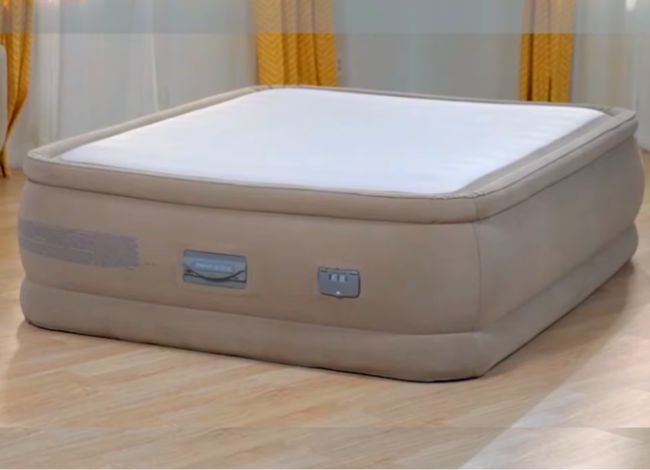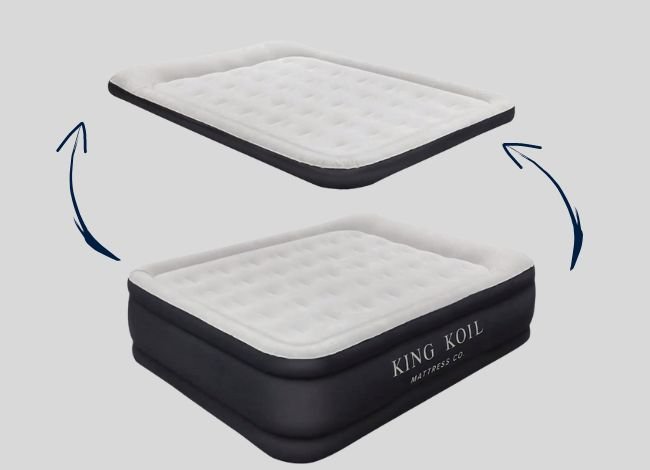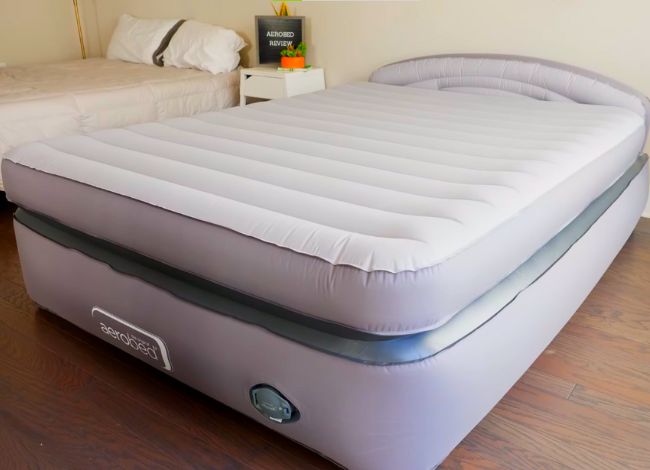Last Updated on June 11, 2023
An air mattress is a type of inflatable mattress that can be used for sleeping or as a temporary bed. It is typically made of a soft, flexible material such as PVC or rubber, and is filled with air to provide support and comfort. Air mattresses are often used as a temporary sleeping solution in situations such as camping, with overnight guests, or when traveling. They can be inflated using a manual or electric pump and can be deflated and rolled up for easy storage and transport. Some air mattresses also have features such as built-in pumps, adjustable firmness, and built-in pillows for added comfort.
Sleeping on an air mattress may not be ideal for everyone, and it is possible that it could cause or exacerbate back pain for some individuals. The level of support and firmness that is comfortable and beneficial for one person’s back may not be the same for another person.
Are air mattresses really comfortable to sleep on?
Contents
Air mattresses can be comfortable to sleep on for some people, but comfort is subjective and can vary depending on the individual’s preferences and needs.
There are several factors that can affect the comfort level of an air mattress, including the material it is made of, the thickness of the mattress, and the level of firmness. Higher-quality air mattresses may be made of more comfortable materials and have a thicker, more supportive design, which can improve overall comfort. Below you can check the advantages and disadvantages of air mattresses.
Pros of air mattresses:
Portability: Air mattresses are lightweight and easy to carry, making them a great option for travel or when you need a temporary sleeping solution.
Versatility: Air mattresses can be used in a variety of settings, including as a temporary bed for overnight guests or as a sleeping option when camping.
Adjustable firmness: Many air mattresses have adjustable firmness levels, allowing you to customize the level of support to your liking.
Affordability: Air mattresses are generally less expensive than traditional mattresses, making them a more budget-friendly option.
Easy storage: Air mattresses can be deflated and rolled up for easy storage, making them a convenient option for people with limited space.
Comfort: Some people find air mattresses to be comfortable and supportive, making them a good option for a temporary or occasional sleeping solution.
Cons of air mattresses:
Durability: Air mattresses may not be as durable as traditional mattresses and may need to be replaced more frequently.
Support: Some people may find air mattresses to be too firm or not supportive enough, leading to discomfort or back pain.
Noise: Some air mattresses can make noise when the air is being adjusted or when the person is moving around on the bed.
Leaks: Air mattresses can develop leaks over time, which can be inconvenient and may require repairs or replacement.
Cold temperatures: Air mattresses can lose air in cold temperatures, which can affect the level of firmness and overall comfort.
Inflation and deflation: Inflating and deflating an air mattress can be time-consuming and may require an electric or manual pump.
Tips for sleeping on an air mattress more comfortably:
- Look for an air mattress that is made of durable and comfortable materials and has a supportive design.
- Many air mattresses have adjustable firmness, so you can customize the level of support to your liking.
- Adding a mattress topper can help to improve the comfort and support of an air mattress.
- Make sure the air mattress is placed on a flat, stable surface to help prevent it from shifting or moving around.
- Use a fitted sheet and a comfortable comforter or blankets to help create a comfortable sleeping environment.
- Follow the manufacturer’s instructions to properly inflate the air mattress. Overinflating or underinflating the mattress can affect its comfort and support.
- Test the air mattress out before using it for an extended period of time to make sure it is comfortable and supportive.
Is using an air mattress every night safe?
Air mattresses can be safe to use, but there are a few potential health risks to be aware of:
- Allergic reactions
Some people may be allergic to the materials used in air mattresses, such as synthetic fibers or chemicals used in the manufacturing process. This can cause skin irritation or respiratory problems.
- Pressure sores
If you spend a long time lying on an air mattress, you may be at risk of developing pressure sores. These are areas of damaged skin that occur when the skin and underlying tissues are pressed against a hard surface for an extended period of time. To reduce the risk of pressure sores, it’s important to change positions frequently and use a supportive cushion or foam mattress topper.
- Mold growth
If an air mattress is not properly cared for, it may develop mold. This can be harmful to people with allergies or respiratory problems. To prevent mold growth, it’s important to keep the air mattress clean and dry and to store it in a dry place when not in use.
Final Thought: Overall, air mattresses can be safe to use as long as they are properly cared for and used in a way that minimizes the risk of health problems. But it is always a good idea to consult with a healthcare professional if you have concerns about back pain or other health issues.